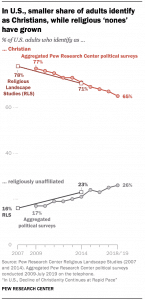
A recent study from the Pew Research Center announces that the trend of decline continues. Pew is a personal favorite for a poll and survey addict like me. I’m no mathematician, I not a statistical wizard, but I love having numbers and graphs to describe phenomena that I think I am witnessing myself.
Other frequent stops for me are the National Opinion Research Center (NORC), with it’s comprehensive General Social Survey (GSS). But Pew remains a favorite. Pew’s extensive surveys from 2007 and 2014 regarding the landscape of Christianity in the United States were landmark studies. In a new study released this week, Pew concludes the decline of Christianity continues, and glean from NORC corroboration of that trend.
For those of us in the work, that’s nothing new. Pastors, denominational leaders, Christian colleges and graduate schools, Christian relief and development agencies, and local congregations all have felt it.
But there are churches everywhere
The large church plants sponsored by megachurches and networks hide the decline when launching churches with perhaps as many 100 people in the core group. We see in our town, several churches of thousands of members, portraying an image that Christianity is prevalent and flourishing. Yet, small churches close annually.
A cultural shift
After identifying the political trends, one, that conservatives strongly supporting Trump don’t go to church; and two, progressives have found churches steeped in patriarchy and anachronistic, Peter Beinart, The Atlantic notes:
Maybe it’s the values of hierarchy, authority, and tradition that churches instill. Maybe religion builds habits and networks that help people better weather national traumas, and thus retain their faith that the system works. For whatever reason, secularization isn’t easing political conflict. It’s making American politics even more convulsive and zero-sum.
Though Beinart’s article is over two-years old, there’s growing evidence that supports his conclusion.
#ChurchToo, Patriarchy, and Political Blindness
Given the image of the church in the recent years, good riddance. There are aspects of the American expression of Christianity that are distasteful from almost any sense of justice, ethics, and mercy. While many mainline denominations have internal processes for dealing with abuse and harassment, the #churchtoo hashtag hit home revealing the patriarchal control has not yet been undone. Along with the continual support of popular “Christian leaders” for the current president like Franklin Graham, Jerry Falwell, Jr., and Robert Jefress, Christianity in the United States looks unappealing, bigoted, archaic, opportunistic, and unethical.
As I was writing this, as is my Friday habit, I searched for new music releases. The Almost have released their album, Fear Caller. Reading about the band, I found the following interview on Church Leader. Band members, Spencer Chamberlain and Aaron Gellespie describe why they left Christianity.
“Chamberlain believes modern Christianity feels like a sales pitch more than anything else. “It’s like they’re selling a product: The really good looking pastor with his wife and his beautiful kids and they seem so happy…It’s almost like they’re selling ‘If you buy into these rules and you do what we do, you can also be like this.’”
It seems, if Chamberlain and Gillespie are representative, the decline of Christianity in the United States is self-imposed.
Can we please just follow Jesus?
It’s On You and Me, Dear Christian Reader
I cannot ask those outside the faith to give us a break. Too look more closely and see us – to see what our actions and our silences reveal – for who we really are, is as crucial as it is difficult. I cannot expect others to weed through our many voices to find the ones that are authentic. This continuing drop in Christianity is on us, on you and me, dear Christian reader.
If I look for verses about abortion, homosexuality, and tax breaks, I can’t find them. We used to want to protect Jesus from commercialism, but how about politicization? Remembering that Jesus orientation, authority, and direction is not from this world-order, John 18.36 .
As we become less connected to a metanarrative of Jesus, we opt for tantalizing and tempting national stories of politics and division. What are the stories that we can speak to with neighbors and strangers? Part of the beauty of Christian anarchy is the imperative to create a competing narrative to bring people together. Consider the world of the Beatitudes
What should the opposite of this decline look like?
As a Christian, I want to see more people affected by the truth of Jesus. Jesus still offers the power:
- To love enemies, Matthew 5.44
- To welcome outsiders and love strangers because God does, Acts 10.34
- To heal broken minds and mend broken bodies, Mark 5.1-15, Luke 8.43-48
- To point to a love above all people, that showers mercy without judgment, Matthew 5.45, Acts 17:22-35
- To feed, clothe, shelter the needy, visit the sick and imprisoned, Matthew 25.35-46
- To befriend as a companion the lonely and the curious and doubting John 15.15, Romans 8:38-39, John 20.26-29
- To create communities of people who live to add life to each other, Acts 2.44-47, Acts 4.32-37
Even if Jesus is presented with integrity, humility, and Jesus-like character, we must remember the story; Jesus was killed as an insurrectionist, a heretic, and as a revolutionary criminal. Being authentic to Jesus may not increase the appeal of Christianity, but at least we can be rejected for reasons that are not antithetical to the gospel. Resurrection for the church comes through way of Jesus, not by just propping up a better image.
Want Craig to come speak at your church, provide a workshop or a retreat? Send an invitation HERE
For more resources from Craig, check out The Missionplace.
And, although we’re on hiatus, subscribe to
The All That’s Holy: Blue Collar Podcast available on iTunes.
















